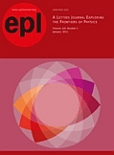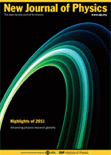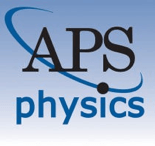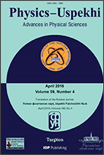
Lithuanian Journal of Physics
Scope & Guideline
Illuminating Insights in Physics Research
Introduction
Aims and Scopes
- Theoretical and Computational Physics:
Research focusing on theoretical frameworks, models, and computational methods to solve complex physical problems, including quantum mechanics, statistical mechanics, and thermodynamics. - Materials Science and Engineering:
Studies on the synthesis, characterization, and application of novel materials, including semiconductors, nanomaterials, and thin films, often involving advanced fabrication techniques. - Optics and Photonics:
Exploration of light-matter interactions, optical properties of materials, and development of photonic devices such as lasers, detectors, and imaging systems. - Condensed Matter Physics:
Investigations into the properties of solid and liquid matter, including phase transitions, magnetic properties, and electronic structures. - Applied Physics and Engineering:
Application of physical principles to solve practical problems in engineering, including the development of new technologies and devices. - Interdisciplinary Studies:
Integration of physics with other scientific disciplines, such as biology or environmental science, to address complex scientific questions.
Trending and Emerging
- Terahertz Science and Technology:
An increasing number of studies focus on terahertz (THz) applications, including imaging and spectroscopy, reflecting the growing interest in THz technologies for various applications in communication, security, and medical diagnostics. - Nanotechnology and Nanomaterials:
Research on the properties and applications of nanomaterials has surged, indicating a strong trend towards exploring their unique physical characteristics and potential uses in electronics, photonics, and materials science. - Quantum Computing and Information Science:
Theoretical and experimental investigations into quantum computing, including qubit systems and quantum information processing, have gained momentum, highlighting the journal's engagement with cutting-edge technologies. - Advanced Laser Technology and Applications:
A notable rise in studies examining advanced laser systems and their applications in various fields, including medical technologies and materials processing, reflects ongoing innovations in laser physics. - Multiscale Modeling Techniques:
Increasingly, researchers are employing multiscale modeling approaches to understand complex physical systems, indicating a trend towards integrating different scales of analysis in physics research.
Declining or Waning
- Classical Mechanics:
Research related to classical mechanics, including foundational theories and applications, has seen a reduction in publication frequency, possibly due to the growing emphasis on quantum mechanics and advanced computational models. - Traditional Material Characterization Techniques:
Studies focused on conventional characterization methods, such as basic spectroscopy or standard thermal analysis, have become less common as researchers adopt more sophisticated techniques that provide deeper insights into material properties. - Environmental Physics:
While still relevant, research specifically addressing environmental physics topics, such as basic pollution studies, appears to be less frequent, possibly overshadowed by interdisciplinary approaches that incorporate environmental concerns into broader physics research. - Historical Perspectives in Physics:
Papers providing historical analyses or philosophical discussions regarding physics concepts are less common, reflecting a trend towards more empirical and application-driven research.
Similar Journals

ACTA PHYSICA POLONICA A
Illuminating the Path of Innovative ResearchACTA PHYSICA POLONICA A is a distinguished peer-reviewed journal published by the Polish Academy of Sciences Institute of Physics, offering a platform for disseminating cutting-edge research in the field of physics and astronomy. With an ISSN of 0587-4246 and an E-ISSN of 1898-794X, this journal has been a staple for scholars since its inception, converging its publication years from 1996 to 2024. Despite its current Q4 classification in the Physics and Astronomy (miscellaneous) category, ACTA PHYSICA POLONICA A provides valuable insights and breakthroughs addressing various aspects of general physics. Researchers, professionals, and students will find a wealth of knowledge within its pages, even as it operates in an evolving academic landscape. While subscription options exist, the journal aims to foster collaboration and knowledge exchange in the physics community, making it a vital resource for those seeking to stay at the forefront of research advancements.

Physical Review Research
Fostering collaboration in cutting-edge scientific discovery.Physical Review Research, published by the American Physical Society, is a premier open access journal dedicated to the dissemination of high-quality research across all areas of physics and astronomy. Since its inception in 2019, this journal has quickly established itself as a vital platform for researchers, achieving a prestigious Q1 ranking in the dynamics of Physics and Astronomy (miscellaneous) and holding a commendable position in the Scopus Rankings with a rank of #29 out of 243, placing it in the 88th percentile. With the commitment to fostering scientific collaboration and transparency, Physical Review Research offers unrestricted access to valuable findings, enabling researchers, professionals, and students alike to engage with cutting-edge contributions in general physics and astronomy. As it converges into its forthcoming years of publication, the journal remains dedicated to showcasing rigorous research and innovative ideas that drive the field forward.

Frontiers in Physics
Shaping the Future of Physics Through CollaborationFrontiers in Physics is a prestigious peer-reviewed journal published by FRONTIERS MEDIA SA, dedicated to advancing the field of physics through innovative research and interdisciplinary approaches. Established as an Open Access journal in 2013, it has quickly become a vital resource for researchers, professionals, and students alike, with a shining presence in Scopus categories such as Biophysics, Materials Science, Mathematical Physics, and Physical Chemistry. With an impressive array of quartile rankings, including Q2 in several key areas, it positions itself firmly among leading journals in the field, reflecting its commitment to high-quality contributions. The journal's global reach and emphasis on collaborative research not only enhance its visibility in the scientific community but also facilitate a deeper understanding of complex physical phenomena. Researchers are encouraged to submit original works that push the boundaries of knowledge, making Frontiers in Physics an essential platform for the latest advancements in the discipline.

SEMICONDUCTORS
Unveiling the mysteries of magnetic materials.SEMICONDUCTORS, published by PLEIADES PUBLISHING INC, is a prominent journal that provides a platform for researchers and professionals in the fields of Atomic and Molecular Physics, Condensed Matter Physics, and Electronic, Optical and Magnetic Materials. With an ISSN of 1063-7826 and an E-ISSN of 1090-6479, the journal has been diligently disseminating knowledge since its inception in 1996 and continues to pave the way for innovative research until 2024. Although currently unclassified in the Open Access model, its influence is underscored by its rankings in Scopus, where it ranks in the 21st-22nd percentile across critical scientific categories. SEMICONDUCTORS serves as an essential resource for cutting-edge research, fostering a greater understanding of semiconductor materials and their applications, thereby assisting the scientific community in pushing the boundaries of technology and innovation.

CHINESE PHYSICS LETTERS
Elevating Global Physics Discourse Since 1984Chinese Physics Letters is a prestigious journal published by IOP Publishing Ltd, based in the United Kingdom. Since its inception in 1984, the journal has served as a vital platform for disseminating impactful research in the field of physics, achieving a noteworthy Q1 ranking in the category of Physics and Astronomy (miscellaneous) as of 2023. Renowned for its rapid publication process, this journal is dedicated to providing a forum for high-quality, concise articles that address innovative theoretical and experimental findings relevant to both the academic community and industry practitioners. With an impressive Scopus rank of #52 out of 243, placing it in the 78th percentile, Chinese Physics Letters continues to influence the global physics landscape. Researchers, professionals, and students alike find this journal indispensable for staying abreast of the latest developments and trends in physics.

EPL
Advancing the Frontiers of Physics and AstronomyEPL, a prominent journal published by IOP Publishing Ltd, stands at the forefront of the field of Physics and Astronomy. With a history of impactful contributions stretching from 1986 to 2024, EPL serves as a dynamic platform for researchers to disseminate their pioneering findings and innovative ideas. The journal, with a current category ranking of Q2 among its peers and a competitive Scopus rank of #101 out of 243 in the general physics and astronomy category, reflects its substantial reputation and contribution to the scientific community. Although it operates under a traditional subscription model, EPL's reach is extensive, enabling access to a diverse readership that includes academicians, industry professionals, and students alike. By fostering interdisciplinary collaboration and promoting rigorous research, EPL continues to play a vital role in shaping the future of physics and astronomy.

NEW JOURNAL OF PHYSICS
Advancing the frontiers of physics research.NEW JOURNAL OF PHYSICS, published by IOP Publishing Ltd, is a prestigious open-access journal that has been at the forefront of the physics community since its inception in 1998. With an impact factor that places it in the Q1 category of Physics and Astronomy (miscellaneous) and a commendable ranking of #49 out of 243 in the general physics and astronomy category according to Scopus, this journal is recognized for its significant contribution to advancing research in the field. The journal caters to a broad scope of topics, providing a platform for the dissemination of cutting-edge research findings and innovative theoretical explorations. Operating from the United Kingdom, it offers a truly international perspective, making its contents accessible and impactful to a global audience. With robust open-access options, the NEW JOURNAL OF PHYSICS ensures that research findings are freely available, promoting collaboration and knowledge sharing among researchers, professionals, and students alike. This commitment to accessibility, combined with its high-quality content, makes it an essential resource for anyone engaged in the physics community.

Frontiers of Physics
Pioneering Discoveries in the Realm of PhysicsFrontiers of Physics, published by Higher Education Press, is a premier open-access journal dedicated to fostering innovative research and excellence within the field of physics. With an ISSN of 2095-0462 and an E-ISSN of 2095-0470, this rapidly growing journal has established itself as a valuable platform for disseminating cutting-edge findings, covering a diverse range of topics from theoretical frameworks to experimental advancements. Notably, Frontiers of Physics has achieved an impressive Q1 ranking in the 2023 Scopus Quartiles for Physics and Astronomy, securing a competitive 5th out of 81 positions in its category, reflecting a high impact factor that underscores its importance to the scientific community. Since its inception in 2011 and continuing through 2024, the journal aims to bridge the gap between academia and industry, encouraging collaboration among researchers, professionals, and students alike. Its commitment to open access ensures that high-quality research is readily accessible, thereby promoting knowledge sharing and advancement in the global physics community. Explore the potential of your research in Frontiers of Physics, where the future of physics flourishes.

PHYSICAL REVIEW B
Elevating Knowledge in the Sciences of MaterialsPHYSICAL REVIEW B, published by the American Physical Society, is a leading journal in the field of condensed matter physics and materials science, particularly focusing on electronic, optical, and magnetic materials. With an ISSN of 2469-9950 and an E-ISSN of 2469-9969, this periodical has garnered a prestigious reputation, achieving a Q1 ranking in both relevant categories as of 2023. The journal has recorded significant impact as reflected in its Scopus ranks, notably positioned at #95 out of 434 in Condensed Matter Physics and #75 out of 284 in the Materials Science sector, illustrating its importance in advancing research and discussions in these critical areas. Although it does not offer open access, PHYSICAL REVIEW B remains an invaluable resource for academics, researchers, and professionals seeking to increase their understanding of contemporary issues in condensed matter and material sciences. Established in 2005, this journal continues to foster innovation and dissemination of knowledge, making it a cornerstone publication for those engaged in cutting-edge research.

PHYSICS-USPEKHI
Elevating Peer-Reviewed Scholarship Since 1993PHYSICS-USPEKHI, published by Uspekhi Fizicheskikh Nauk, is a prominent peer-reviewed journal in the field of physics and astronomy, reaching researchers and professionals since its inception in 1993. With an ISSN of 1063-7869 and an E-ISSN of 1468-4780, this esteemed journal has been classified as Q2 in the Physics and Astronomy category based on the 2023 quartiles, ranking 74 out of 243 journals in its Scopus classification, placing it in the 69th percentile. Although currently not an open access journal, it provides invaluable insights and advancements in the field, fostering an environment for scholarly exchange and collaborative research. Based in Moscow, Russia, PHYSICS-USPEKHI continues to shape the landscape of theoretical and experimental physics, inviting submissions that contribute to its rich legacy of high-impact scientific discourse.